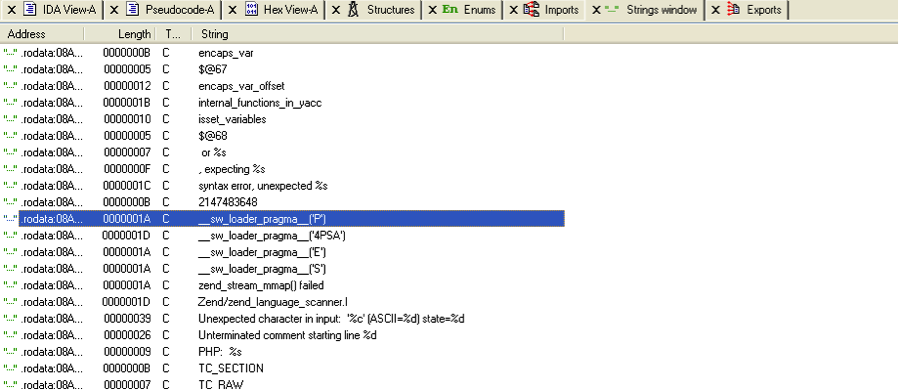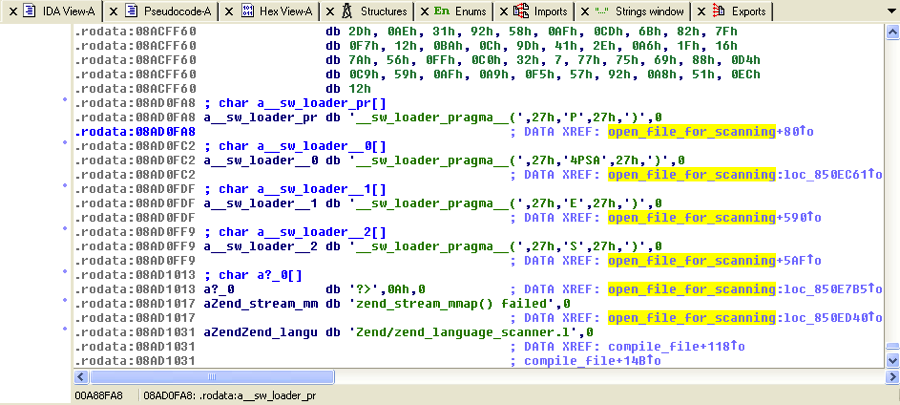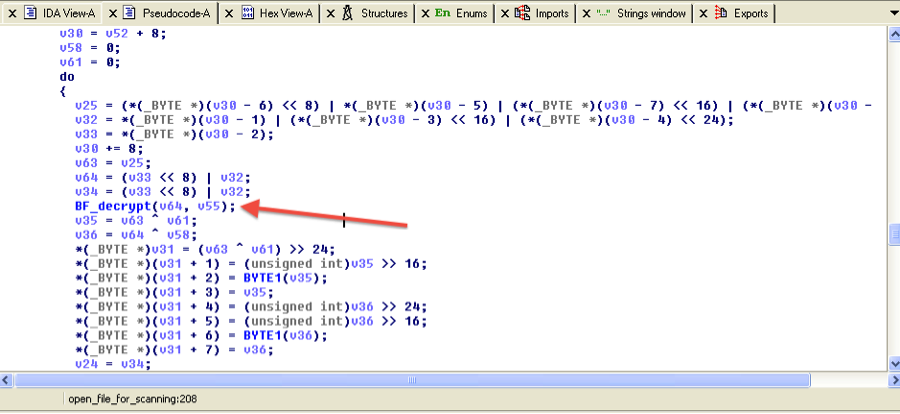
Plesk panel decryption
After I read the description of the Plesk vulnerability CVE-2012-1557 I decided to investigate the application a bit deeper. You can download a fully installed VMware image from the internet so you can skip the install and save some time. The PHP files which belong to the PLESK application are encrypted:
[root@localhost tmp]# cat /usr/local/psa/admin/htdocs/index.php
die(“The file {$_SERVER[‘SCRIPT_FILENAME’]} is part of Plesk 9 distribution. It cannot be run outside of Plesk 9 environment.\n”);
__sw_loader_pragma__(‘P’);
?>
1^:??Zl??9??W??RK?3??^Om??n.#’?N”??64?Z??W?[>?p?vW???`J?1?R?y?E?i38???
First of all I investigated the /usr/local/psa/bin/sw-engine-pleskrun executable which is a modified PHP interpreter:
[root@localhost ~]# /usr/local/psa/bin/sw-engine-pleskrun –help
Usage: sw-engine [options] [-f] [–] [args…]
sw-engine [options] -r [–] [args…]
sw-engine [options] [-B <begin_code>] -R [-E <end_code>] [–] [args…]
sw-engine [options] [-B <begin_code>] -F [-E <end_code>] [–] [args…]
sw-engine [options] — [args…]
sw-engine [options] -a
-a Run interactively
-c | Look for php.ini file in this directory
-n No php.ini file will be used
-d foo[=bar] Define INI entry foo with value ‘bar’
-e Generate extended information for debugger/profiler
-f Parse and execute .
-h This help
-i PHP information
-l Syntax check only (lint)
-m Show compiled in modules
-r Run PHP without using script tags
-B <begin_code> Run PHP <begin_code> before processing input lines
-R Run PHP for every input line
-F Parse and execute for every input line
-E <end_code> Run PHP <end_code> after processing all input lines
-H Hide any passed arguments from external tools.
-s Output HTML syntax highlighted source Output source with stripped comments and whitespace.
-z Load Zend extension .
args… Arguments passed to script. Use — args when first argument
starts with – or script is read from stdin
–ini Show configuration file names
–rf Show information about function .
–rc Show information about class .
–re Show information about extension .
–ri Show configuration for extension .
I tried to inspect the syscalls of the Plesk binary:
[root@localhost tmp]# strace ./sw-engine-pleskrun ../admin/htdocs/index.php
execve(“./sw-engine-pleskrun”, [“./sw-engine-pleskrun”, “../admin/htdocs/index.php”], [/* 23 vars */]) = 0
brk(0) = 0x8dc9000
.
.
.
getppid() = 17921
clone(child_stack=0, flags=CLONE_CHILD_CLEARTID|CLONE_CHILD_SETTID|SIGCHLD, child_tidptr=0xb77967e8) = 17923
waitpid(17923, DEBUGGER DETECTED… Bye!
Killed
I did a quick search for the error message in the binary:
[root@localhost tmp]# strings /usr/local/psa/bin/sw-engine-pleskrun | grep “DEBUGGER DETECTED”
[root@localhost tmp]#
Found nothing, so it seems that the sw-engine-pleskrun binary is just a framework executable and another one does the actual PHP processing. Let’s see which files are accessed by the binary:
[root@localhost tmp]# strings /usr/local/psa/bin/sw-engine-pleskrun | grep -i “/usr”
/usr/bin/sw-engine
/usr/sbin/rblsmtpd
/usr/local/psa/bin/php-cli
/usr/share/awstats
/usr/share/tomcat6
/usr/lib/mailman
/usr/bin
/usr/bin/webalizer
/usr/local/psa
The sw-engine and the php-cli binaries seem to be good targets from the list above. When I ran the php-cli application I got the following message:
[root@localhost tmp]# /usr/local/psa/bin/php-cli /usr/local/psa/admin/htdocs/index.php
Failed loading /usr/lib/php/modules/ioncube_loader_lin_5.3.so: /usr/lib/php/modules/ioncube_loader_lin_5.3.so: cannot open shared object file: No such file or directory
The file /usr/local/psa/admin/htdocs/index.php is part of Plesk 9 distribution. It cannot be run outside of Plesk 9 environment.
Let’s see what our first contestant says when we ask it to parse an encrypted PHP file:
[root@localhost tmp]# /usr/bin/sw-engine /usr/local/psa/admin/htdocs/index.php
Fatal error: Call to undefined function get_gpc() in /usr/local/psa/admin/htdocs/index.php on line 2
Sounds good! Fire up the IDA Pro Disassembler and collect some starting information: Look for the plain strings from the encrypted PHP files in the binary (like “__sw_loader_pragma__(‘P’);”):

Let see which function references this string:

By deeper investigating the open_file_for_scanning() function you will see that the BF_decrypt() function constructs the executable PHP code:

For the quick and effective result – bypass the ptrace, debug the decrypt function, collect the crypto key, etc… – I used the following method:
The open_file_for_scanning() function uses memcpy() to construct the unencrypted PHP code. I created a shared library which redeclares the memcpy function, I used it with the LD_PRELOAD technique and voila, readable source code:
#include
#include
int i=0;
void *memcpy(void *dst,const void *src,size_t len){
if((strstr(src,”);”) > 0) && (i==0)){
printf(“%s\n”,src);
i=1;
}
register char *src_c, *dst_c;
src_c = (char *)src;
dst_c = (char *)dst;
while (len– > 0)
*dst_c++ = *src_c++;
return dst;
}
Compile the shared library with the following commands:
[root@localhost ~]# gcc -fPIC -c ld.c -o ld.o
[root@localhost ~]# gcc -shared -o ld.so ld.o
Set up the LD_PRELOAD environment variable and get the PHP source code:
[root@localhost ~]# LD_PRELOAD=/tmp/ld.so /usr/bin/sw-engine /usr/local/psa/admin/htdocs/login_up.php3
require_once(’cmd_loginup.php’);
require_once(‘sso/RelyingParty.php’);
$login_name = rtrim(get_gpc(‘login_name’));
$passwd = get_gpc(‘passwd’);
if ($session->getType() != IS_UNDEFINED && !($login_name && $passwd))
go_to(‘/logout.php3’);
if (!headers_sent())
header(‘X-Plesk: PSA-Key/’ . getKeyProp(‘plesk_key_id’));
$session_created = false;
$ssoAuthentication = null;
….
This method is far from perfect but it is easy, quick and the result is the plain source code. Happy bug hunting! ☺